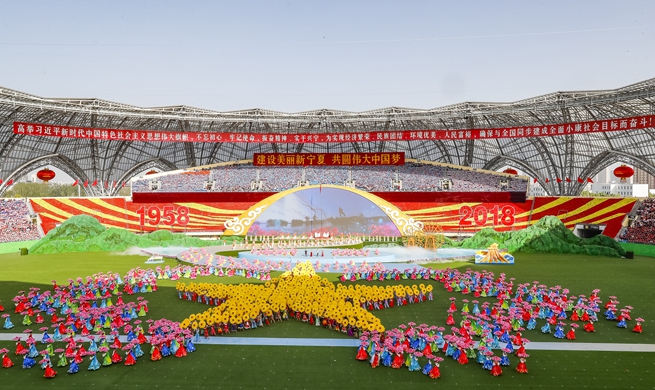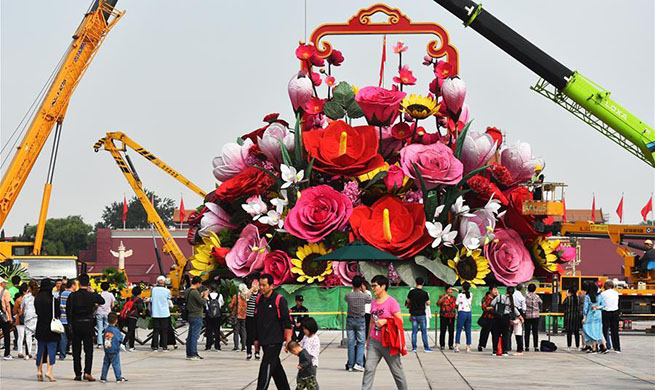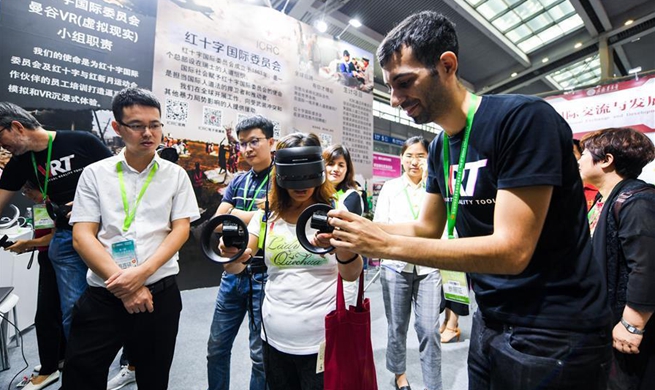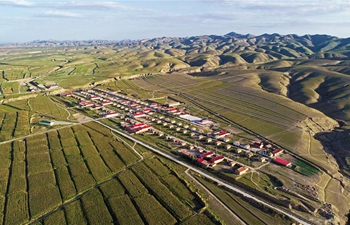TOKYO, Sept. 20 (Xinhua) -- Japanese Prime Minister Shinzo Abe, winning the ruling party's leadership election Thursday, will likely to become Japan's longest-serving leader, but underwhelming support shown by rank-and-file party members may spell difficulties ahead for both party and president, political analysts said.
In the leadership race, Abe's only opponent was former Defense Minister Shigeru Ishiba who in the run-up to the election voiced different views to Abe on constitutional reform and economic policies and ended up mounting a far-bigger challenge to the incumbent than expected.
Local political observers pointed out that while Abe has secured the top party post for a third-consecutive term, effectively ensuring his position as the nation's next prime minister owing to the ruling coalition's majorities in both chambers of parliament, Ishiba garnering far more support than expected from rank-and-file members has certainly raised some red flags looking ahead.
While Abe won 329 out of ballots cast by Diet members, and 224 by rank-and-file members, Ishiba secured 73 votes from legislators but an unexpected 181 votes from ordinary members, who closely reflect public opinion.
This, political analysts said, was to a certain extent down to increasing opposition to the prime minister's long reign amid ongoing cronyism allegations, ineffectual economic policies and the railroading through parliament of contentious legislation, including those related to security, to push forward his constitutional reform agenda.
The underwhelming support in the leadership election, described by political watchers here as a "backlash" by the LDP's rank-and-file members, is "most certainly" reflected in public opinion, specialists in politics and national ideology have maintained.
"People have begun to feel weary of slogan-only and deceptive politics and Abe's style of the privatized use of public power and hawkish stance toward diplomacy and East Asian international relations," Dr. Shin Chiba, professor with Special Appointment, who specializes in political theory, said.
Abe, following his victory, was quick to reiterate his plans to forge ahead with his career goal of revising the nation's Supreme Law for the first time since World War II, having controversially and against public and constitutional experts' opinions redefined the role of the Self-Defense Forces (SDF) three years ago, to allow it to take part in collective-self defense and come to the aid of an ally under attack, even if its own territory is not threatened.
Henceforth, Abe will thus seek to secure the two-thirds majority needed in both houses of parliament and a majority in a national referendum to bring about his legacy-led revisions to the constitution, which will specifically make reference to the SDF and "purportedly" clear up its current constitutional ambiguity.
However, as recent polls have suggested, the Japanese public are far more concerned about the dire fiscal health of the nation, rather than the prime minister's singular goal of revising the Supreme Law for the first time since it took effect in 1947.
Abe's reasons for constitutional reform are both personal and political. He is a long-time devotee of constitutional reform and has used geopolitical pretexts to push forward his reforms, noted Tina Burrett, Associate Professor of Political Science at Sophia University.
"The public are split on the issue of reform... for most voters, however, the economy and public services are far more important issues," she said.
Her sentiments have been echoed by other experts on the matter, with Yu Uchiyama, a political scientist at the University of Tokyo, believing Abe's constitutional agenda is far from a straightforward one, with a public mandate on the issue possibly going awry.
"Even if Abe manages to force a revision through parliament, he would face a referendum, raising the prospect of a Brexit-style political meltdown if the people vote against him," Uchiyama said.
With public support for the premier and his Cabinet tepid at best amid myriad cronyism scandals and economic malaise perpetrated by a vastly unclear blueprint as to how to deal with the nation's ballooning social welfare costs related to its rapidly aging and shrinking society, security issues are currently not a public priority, political experts have attested.
Christian Collet, from International Christian University's Politics and International Relations faculty maintained that the Japanese populace believe that Article 9 of Japan's pacifist charter, that states that Japanese people forever renounce war and that land, sea, and air forces, as well as other war potential, will never be maintained, despite Abe's aspirations, should remain as is.
"Significant segments of the public will continue to resist the efforts to revise Article 9 and there is near unanimous opposition to Japan becoming a nuclear power," the expert said.
With Abe only gaining about 55 percent of all votes at the local level in the leadership election, members in the ruling camp have been quoted as saying the figures were "shocking," particularly as they closely reflect public opinion.
LDP party members have also said that the worse-than-expected voting numbers could suggest that victory in the upper house election slated for the summer of 2019 might not be a shoo-in for the ruling camp, with an LDP executive describing the outcome of the leadership vote as "a revolt from the local regions."
Criticism is now swirling within the ruling party following Thursday's presidential election, reflecting rising dissent from factions within the party based on the lack of support for Abe staying at the helm from the party's own rank-and-file members, sources close to the matter said.
People both support and don't support him (Abe) at the same time, said Masao Matsumoto, professor in the Social Survey Research Center at Saitama University, highlighting the political and public divide.
And, Abe's sole rival in the leadership race was of the same opinion, in terms of both the ruling party and its leader and a growing lack of cohesion.
"The presidential election demonstrated the LDP is not of one color," Ishiba told a press briefing after the vote, underscoring the fact that the road ahead for the party and its president is, indeed, a bumpy one.













